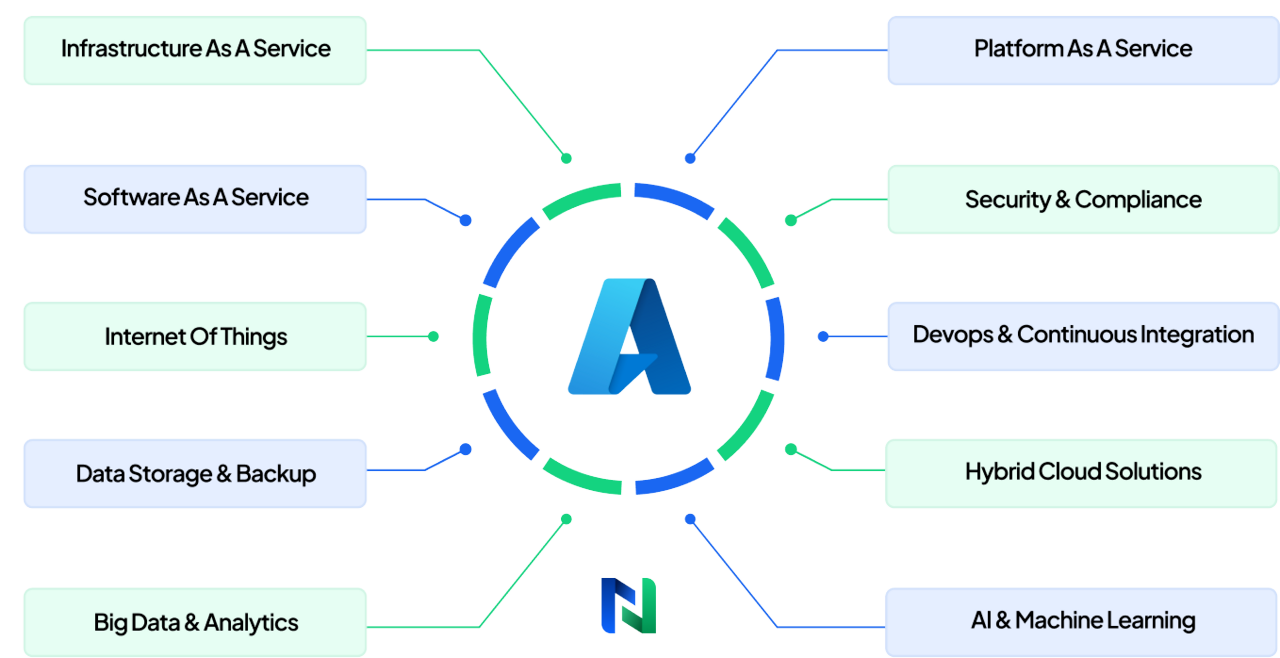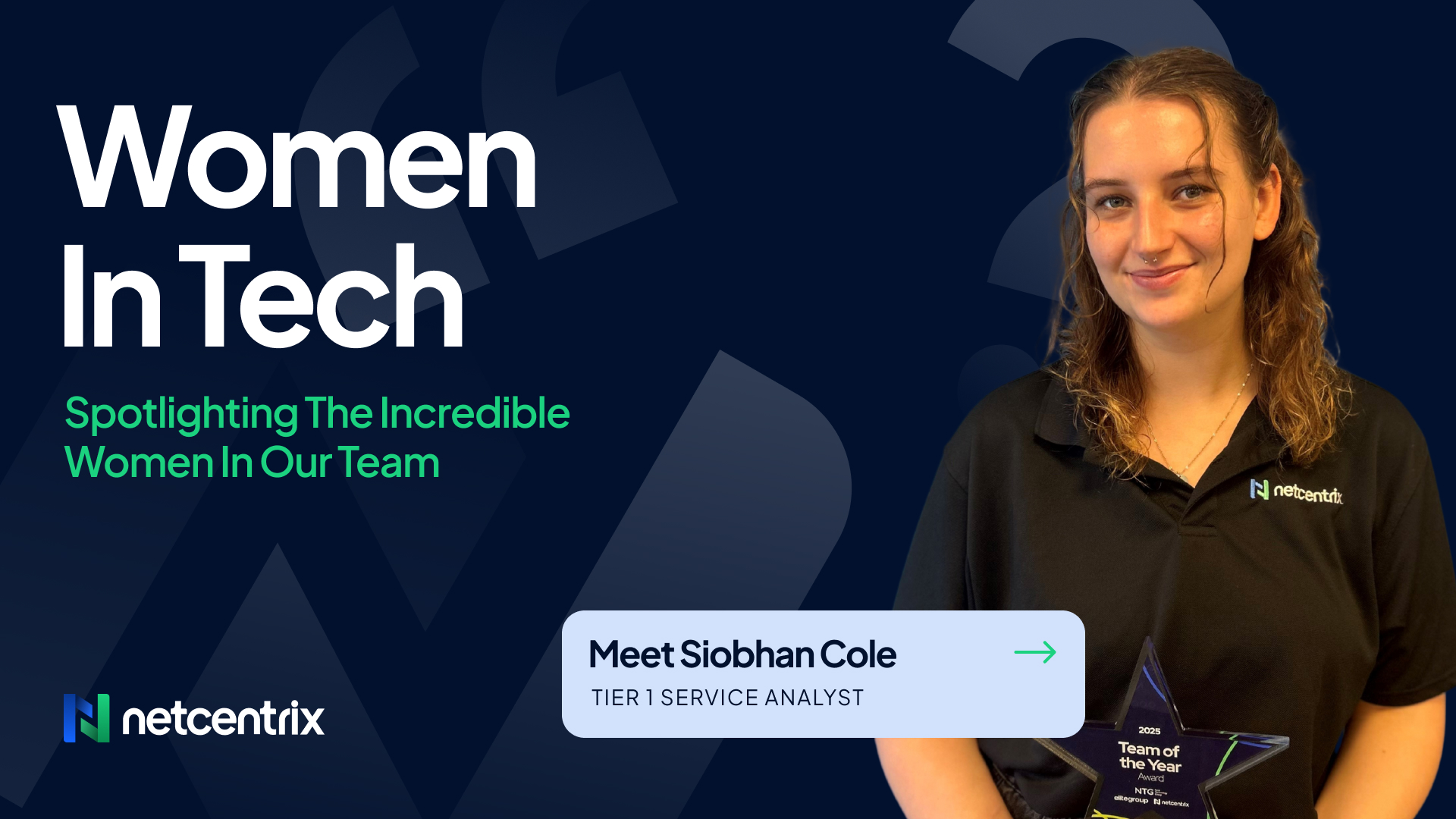Initially launched in 2008, Microsoft Azure (formerly Windows Azure) has evolved over the years to become the go-to public cloud computing platform choice for businesses in every country seeking to access the digital tools and services they need to thrive. All accessible via the Azure Portal, the platform is home to over 200 cutting-edge Microsoft Azure services and products (more than any other cloud providers) that let businesses do everything from developing desktop and mobile apps to analysing in-depth data, creating virtual environments and much more.
As it’s so expansive, it can be difficult for businesses to recognise whether Microsoft Azure is the right cloud platform for them, and whether Microsoft is the right cloud service provider. So if you’re curious to know what Microsoft Azure is used for, Netcentrix is here to offer some insight into how Azure can transform and enhance business operations, so you can make an educated decision. Let’s get into it.
What is Microsoft Azure Used for in Business?

3 Main Uses of Microsoft Azure
1. Infrastructure as a Service (IaaS)
Infrastructure as a Service removes the need for businesses to purchase physical hardware, servers and spaces to host and manage their IT infrastructure. Instead, access to these resources is provided by a third-party cloud host. In this case, the Azure web hosting platform. This allows businesses to scale their infrastructure quickly and easily, saving time and money, while also offloading the responsibility of technical fixes and daily IT woes.
Microsoft Azure is a particularly appealing platform for IaaS because it specialises in the creation and management of virtual machines. Virtual machines are similar to the environment presented by desktops stored on physical hardware, though they’re hosted completely in the cloud and can sit entirely separate from a business’s main network. This not only boosts the security prospects of these environments, but also relieves pressures such environments may place upon on-site hard drives and servers.
Azure’s IaaS capabilities also offer attractive network solutions. Azure Virtual Networks allow your business to create alternate networks from your main business network, protecting data should the main network be breached. Plus, the Azure VPN Gateway (Virtual Private Network Gateway) allows you to route your network traffic through external servers, hiding your IP address and preventing hackers from accessing your sensitive files.
2. Platform as a Service (PaaS)
Platform as a Service is a use of Microsoft Azure that allows you to conceive, develop, execute and manage complex applications and environments, all hosted and accessed via the cloud. This is one of the key components that makes Azure such an appealing tool for businesses, as the platform offers multiple tools businesses can use to create their own digital tools and services at will.
The Azure App Service is the industry standard when it comes to building, testing and deploying new apps, offering an all-encompassing service to develop in a multitude of languages, suitable for various operating systems. In the same breath, Azure Functions also allows for the creation of new apps with an emphasis on serverless applications and heightened security. Combined with Azure Logic Apps, which creates automated workflows and prebuilt options, businesses can streamline app creation and take some of the stress out of the overall process.
Azure also offers plenty of options for Database Management. Azure SQL Database allows you to build apps in structured query language (SQL) while also integrating other Azure services with no need for coding or swapping languages, for a more streamlined process. Alternatively, if SQL databases aren’t suitable for your needs, Cosmos DB can manage the storage of NoSQL data.
3. Software as a Service (SaaS)
Software as a Service refers to the accessibility of software that is hosted externally in a cloud environment, rather than stored in-house on hard drives and servers. The management of this software, including all updates and security, also falls to the third-party provider in question, making it an attractive prospect for busy companies.
Through Azure, businesses can access popular SaaS offerings, such as Microsoft Office 365 and Dynamics 365. Office 365 is a business’s one-stop shop for applications used by countless employees at all levels, including classic apps like Word, Excel, PowerPoint and more. Dynamics 365, on the other hand, offers businesses impressive CRM (Customer Relationship Management) and ERP (Enterprise Resource Planning) applications powered by artificial intelligence.
By accessing software through a cloud subscription model, businesses can avoid the pressures of ensuring applications are always updated, from both a version and security standpoint, as well as being able to access software from anywhere with an internet connection, on virtually any digital device, making it ideal for remote and hybrid workers.
What Are the Other Uses of Microsoft Azure?
1. Data Storage and Backup
As Azure is accessed via the cloud, any data uploaded, created or shared on Azure is automatically stored off-site in a separate server by a third-party provider (in this case, Microsoft). Azure Backup and Azure Site Recovery are both excellent options for businesses that need to protect large amounts of data, including applications and other in-depth tools, that can be quickly recovered in the event of a catastrophe.
Beyond this, for more complex data needs, Azure Blob Storage allows for the storage and protection of unstructured data, creating data lakes you can use to recall data during the creation of new apps. In contrast, Azure Files and Azure Disk Storage can be used to store and share more traditional forms of data in large quantities.
2. Big Data and Analytics
Azure is home to various tools businesses can use to upload, view and analyse large quantities of data, so they can make educated decisions about the direction of their business, products or services as a result. This proactive strategy ensures a business is doing everything it can to stay ahead of the competition and understand its audience base on a deeper level.
If you’re dealing with big data warehouses, Azure Synapse Analytics is a great way to cut the amount of time it takes to derive important details from big data, accelerating the process, so you can pivot your plans faster if you need to. Azure Databricks, on the other hand, is a tool you can use to collect all your data sources into one single, overarching platform, simplifying data analysis.
To make this data digestible and comprehensible throughout your business, Azure Power BI utilises native AI to visualise data and share it across all areas of your business, so everyone can reap the benefits.
3. Artificial Intelligence and Machine Learning
Artificial intelligence has moved forward in leaps and bounds in recent years. Today, 65% of businesses use AI in some form, according to a report by McKinsey, highlighting the importance the tool holds for many. Machine learning is also being widely adopted, with many taking advantage of automated or simplified solutions as a result of the tool’s ability to predict trends and adapt to needs.
Azure is home to numerous AI-powered services. AI Search, for example, harnesses the technology to allow businesses (and the customers they serve) to quickly search websites and databases, with the AI working to determine the data being searched for and produce results in rapid time. Whereas Azure Machine Learning is used to build machine learning models that can accelerate workflows while developing flexible AI-powered tools, saving time and effort on the part of real-life workers.
Thanks to the addition of AI and machine learning, and the enhancements they provide, users can create intelligent apps within Azure that harness factors like natural language processing and image recognition, allowing apps to recognise both speech and images clearer and quicker than ever before.
4. Internet of Things (IoT)
The Internet of Things refers to the development and expansion of internet-connected devices and how these devices take hold and can be put to use in both society and business. Internet-powered devices that are not traditionally connected to the internet, such as CCTV systems and kitchen appliances, are good examples of the progression of IoT. In business, IoT has been used to monitor and manage things, such as warehouse stock numbers and to detect the state of machinery, and whether or not repairs are required.
If your business has various internet-connected devices you need to manage, Azure IoT Hub is a great way to monitor and maintain connection with these devices from one secure cloud-hosted application. IoT Central, on the other hand, also offers seamless management of IoT devices while also offering tools to help build and expand your network of IoT devices.
By investing in effective IoT tools, businesses can give themselves a far greater understanding of company needs on a technical level, spot emerging issues and solve them before they cause further harm and delay production, and so much more.
5. DevOps and Continuous Integration/Continuous Deployment (CI/CD)
To ensure your project goes from inception to completion as planned with as few hiccups as possible, Azure features several tools to help see development and implementation straight through from beginning to end. Azure DevOps Services includes Azure Pipelines which allows users to build and test tools in almost any language, before ultimately deploying them. DevOps also offers tools to track version control, ensuring there are no crossed wires during a project, as well as collaborative tools, so every member of the team can give it their all.
A key advantage of DevOps, though, is that it assists in the streamlining of software development and deployment. This is known as continuous integration and continuous deployment (CI/CD). In CI/CD, all developers work on a project continuously at the same time, sharing code, while automated processes pick up any code issues and solve them as the project moves forward. This saves countless hours and encourages greater sharing of ideas throughout.
6. Security and Compliance
As it is one of the most widely used cloud platforms on Earth, it’s understandable that Microsoft has invested a lot of time, effort and resources in ensuring Azure security services are up to scratch. Microsoft Defender for Cloud is a prime example. A wide-ranging security solution for cloud environments – including, but not limited to Azure – Defender is designed exclusively to protect cloud-based environments and applications from cyber-attacks. This includes cloud security posture management and cloud workload protection solutions you can use to protect specific cloud-based storage areas, applications and environments, as well as suggesting preventative measures you can take to protect data. Microsoft Sentinel (formerly Azure Sentinel) also weeds out threats and neutralises them, while offering a more comprehensive view of your entire enterprise’s cloud security.
Azure also has a keen focus on ensuring businesses are totally compliant with all relevant regulations, to avoid potential hassle down the line. These can be both industry and area-specific, so you’ll always be aware of the rules you need to follow, including GDPR and HIPAA, among others.
7. Hybrid Cloud Solutions
Many modern businesses have adopted a multi-cloud way of working, so not all of their eggs are in a single basket. This has various advantages, like being able to make the most of services from different vendors, or for staff across multiple departments to work with the tools that work for them. Microsoft was well aware of this, which is why Azure comes with hybrid cloud solutions.
If you are working with multiple cloud environments, Azure Arc allows you to seamlessly connect Azure with these environments as you develop projects, with the flexibility to take advantage of the tools within these environments, and vice versa. Azure Stack, on the other hand, lets you build hybrid cloud applications across numerous locations, including edge environments and remote offices.
This level of flexibility and control encourages easier management of multiple hybrid workloads and simplifies processes across environments, saving time and boosting time to completion.

Unlock the Uses of Microsoft Azure with Netcentrix
If you’re ready to explore Microsoft Azure and embrace the significant advantages of its uses for your business, speak to Netcentrix.
With decades of experience in business technology and Microsoft cloud products, and a team of expert specialists and engineers ready and waiting to help you onboard the platform, we’re undoubtedly the best choice. Better still, as a certified Microsoft Solutions Partner, we’re trusted by the technology behemoth to offer their products and services to businesses just like yours, so you know you’re dealing with professionals.
You’ll also be assigned a dedicated account manager whose responsibility it will be to oversee the onboarding process, and beyond, offering the support you need as and when you need it.
To find out more about our Microsoft Azure service, and Microsoft as a cloud provider, get in touch with a Netcentrix expert today.

















